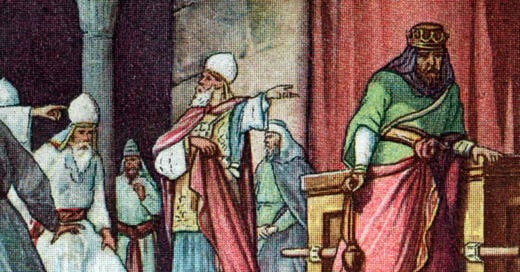A trespass in the temple: The tragedy of King Uzziah
Uzziah has the life path we expected from Adam, with death immediately following disobedience.
“His fame spread far and wide, for he was greatly helped until he became powerful. But after Uzziah became powerful, his pride led to his downfall.” — 2 Chronicles 26:15-16
King Uzziah’s picture should be in the Bible Dictionary under “Pride goes before destruction.”
Uzziah was doing well for himself. Just 16 when he took over for father Amaziah, Uzziah has to grow up fast, and does.
Over his 52-year reign, Uzziah bests the neighboring Philistines, Goliath’s people, in war.
He fortifies Jerusalem with modern weaponry, with “machines designed by skillful men for use on the towers and on the corner defenses to shoot arrows and hurl large stones.”
He was “greatly helped,” the book says, “until he became powerful.”
And then pride led to his downfall.
So much of the Bible is an instruction to act against instinct. Because darkness is the default, we’re taught to seek the light. Because we’re naturally fearful, we are told to “be of good courage.”
And because we are prideful after success, we’re told to remember God. After we get a new job, or a new home, or a new homeland, it’s easy to think we did it ourselves. It’s common to say we are “lucky.” The truth is, we’re blessed, and it’s important to say so.
Uzziah’s heart was arguably in the right place, stepping into God’s house, rather than a house of ill repute, as other kings might have.
Still, Uzziah knew he was overstepping his crown. And he did it anyway. That’s why the king tiptoed in by himself, rather than rolling in strong, with an entourage. People act differently — sheepishly — when they’re in the wrong.
Church and state weren’t exactly separate back then, but they were different. Every king was paired with a priest or prophet, and had access to many. They conveyed God’s word to God’s appointed leader.
With the crown sitting heavy on his head, Uzziah could no longer countenance an authority greater than himself. He certainly wasn’t about to ask permission to light some incense in the temple.
But just as a prophet couldn’t barge into the king’s home, the king couldn’t barge into God’s house. The king had authority but not that authority, which could only be God-given. There are experiences beyond even the king’s paygrade, and lighting incense at the temple was one of them.
Uzziah is not alone long in God’s house. Before he even lights the incense, he hears the voice of priest Azariah, along with 80 other “courageous priests of the Lord,” as 2 Chronicles 27:17 calls them.
Courageous is right. It was not uncommon for prophets and priests to be jailed or killed for speaking God’s word in a way that conflicts with the king’s wishes.
That dynamic underlies the priest-king relationship throughout the Bible. There is a reason Azariah needed strength in numbers when confronting the king. It’s God’s house, yes. But it’s the king’s army.
The king has acted out of turn, and the priests say so. Kings aren't empowered to light incense in the temple. Only priests do that.
Uzziah’s act of defiance is reminiscent of Genesis 3, when Adam and Eve eat from the Tree of the Knowledge of Good and Evil. Except Uzziah needs no enticing, from a talking serpent. He gets that from the voice in his head, that tells him there are no limits for the king.
“Leave the sanctuary, for you have been unfaithful, and you will not be honored by the Lord God,” the priests tell Uzziah in 2 Chronicles 27:18, when they spot him.
Uzziah’s anger begins to bubble up, as is the king’s prerogative. But before it could burst, “leprosy broke out on his forehead…The Lord had afflicted him,” Uzziah.
The priests try to hurry Uzziah out of the temple, but by now he wants out.
It’s too late, though.
Uzziah has leprosy until his death, and lives in a home separate from his castle, “excluded from the temple of the Lord.”
Whether it’s the first two humans in creation or the king of Israel, people have a human need to go where they’ve been specifically denied entry.
What’s in the holy of holies? What happens if I eat from this tree? What if I touch that hot stove? Like children, we test boundaries and authority and to see if anyone really cares.
God told Adam he will “surely die” if he eats from the tree, but Adam lives 930 years.
Uzziah dies at 78, presumably soon after getting leprosy. Uzziah had the character arc we expected from Adam: He tasted the forbidden fruit, and paid for it with his life.
In Uzziah’s case it was especially sad. He didn’t even get to light the incense that cost him his life.




